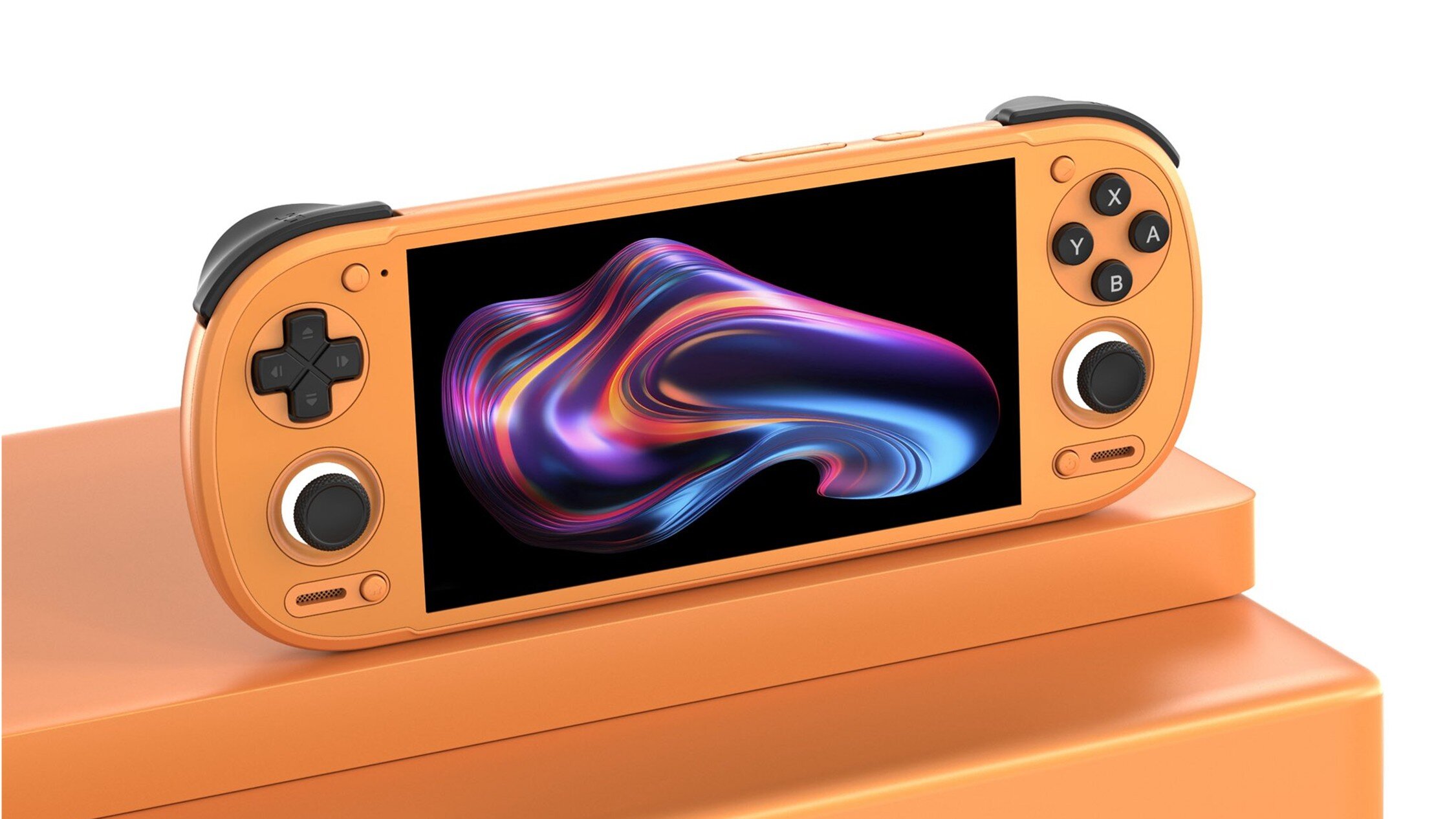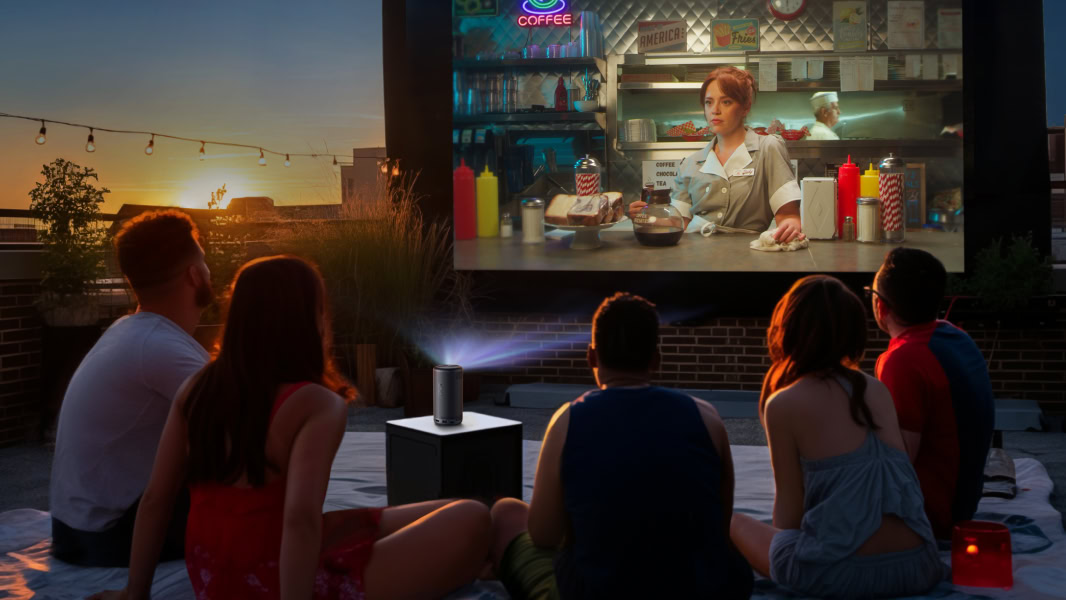A high quality 4K projector with a few limitations that hold it back.
A brilliantly built projector, the automatic lens cover adds an air of quality. Overall, with its bright picture and Dolby Vision support, the XGIMI Horizon S Max is a quality projector that can display a brilliant 4K picture. It’s the little things that let it down: one HDMI port is a little stingy, Android TV is an odd choice, and compared to the best, image quality is a little behind the pack.
-
Lots of automated setup routines -
High-quality picture -
Very bright -
Motorised lens cover
-
Android TV -
Only one HDMI input
Key Features
-
Gimbal stand
Rotate and angle the projector to point it where you want it. -
Dolby Vision
Get the best image quality with Dolby Vision support built in. -
4K image resolution
Uses XPR technology to produce a 4K image.
Introduction
Just because you want flexibility doesn’t mean that you should have to accept losing quality and features in a portable projector, as the growing number of high-brightness and high-resolution portable projectors shows.
That’s the market the XGIMI Horizon S Max is going for, with 3100 ISO Lumens of brightness, a dual light source and Dolby Vision all included.
It’s a crowded market, and the suffers from a few limitations, including a single HDMI input and the older Android TV operating system. Are these enough to make rivals better? Read my full review to find out.
Design
- Gimbal stand
- Only one HDMI input
- Android TV
Switching to a gimbal design, similar to that used on the JMGO N1S Ultimate 4K, the XGIMI Horizon S Max is built to be more flexible and easier to set up. Whether or not you need that gimbal design depends on where you’ll use the projector. If you carry it around a lot, then it’s quite handy; if you can use the projector in a fixed spot in a room, then it’s less so.

Its integrated gimbal stand lets the projector tilt up and down, while the disc on the bottom gives you rotation, so it’s easy to make fine adjustments to line the projector up with a screen.
If you do want to use a stand or tripod for mounting, then there’s a standard screw thread underneath.


To protect the lens, the XGIMI Horizon S Max has a motorised fabric screen that slides down when the projector is turned on, and back up when it’s turned off. It’s nice to have, and also stops dust accumulating on the lens when the projector’s not in use.


It’s a slight shame that there’s no carry case in the box. With the JMGO line-up and the Valerion Vision Master Pro 2, you get a hard carry case in the box, which makes transportation and storage easier.
Ports are a bit disappointing on this projector, with a single HDMI 2.1 (with eARC) port on the rear for external devices. At this price, I’d expect two HDMI ports at the least.


Two USB-A ports are available, which you can use for external storage or for powering a media streaming device, such as a Fire TV Stick. Given the use of Android TV, it’s likely you’ll need on, too.
XGIMI provides the same style of remote that it has provided for years. It’s simple, with just the minimum number of buttons you need for navigation Android TV, but it doesn’t have any shortcut buttons to launch media streaming apps, such as Netflix.


Of course, it’s a Bluetooth remote with an integrated microphone, so you can activate the Google Assistant.
Features
- Runs Android TV
- Dolby Vision supported
- Lots of picture controls
Rather than running Google TV, which is fast becoming the norm, this projector uses Android TV. It’s a worse choice, not because of the interface or access to apps, but because automatic configuration via a smartphone only works via an Android device.
If you’ve got an iPhone, you’ll have to manually type in your Google Account’s email address and password, which is far slower.


App support is similar to with other projectors: the main streaming apps (Netflix, Disney+, Apple TV+, Amazon Prime Video, Paramount+ and NOW) are all supported, but there’s no support for BBC iPlayer. For completeness, you’ll want to plug in a streaming stick.
There’s no optical zoom on this projector, unlike with the Horizon Ultra, so you’re limited to its 1.2:1 throw ratio, which seems to be the default for all portable projectors. With this kind of throw ratio, you can have a 60-inch screen at a distance of 1.59m.
XGIMI practically invented automatic setup routines, and the XGIMI Horizon S Max is packed with them. Stick it facing a screen and the onboard sensors give you automatic keystone correction and autofocus.


There’s also automatic obstacle avoidance, where the projector can be pointed at a wall, and the image will be resized to avoid things like light switches.
If you have a screen, there’s automatic screen alignment, where the projector will line its image up to the borders of a screen. It takes the legwork out of the adjustment, but I found that I had to take care of the final adjustments manually.
As all the corrections, bar focus, are digital corrections, they eat into the available resolution, so I recommend lining the projector up as best as you can using physical movements and then using the digital ones to finetune the image.
Wall colour adaptation is handy to have if you’re going to travel with this projector and can’t always use a screen. Using this feature, the projector will compensate for coloured walls, removing the tint they create; a projector screen is a better option if possible.


Dual Light 2.0 can be disabled, reverting back to the Tri-colour laser only. This knocks back brightness, so it isn’t as good for HDR, but it increases the colour gamut for more vivid colours; however, if you’re sensitive to speckle and colour fringing, laser-only may be an issue. All I can say is to try both modes and pick the one that works for you.


Picture modes are a bit more involved with this projector than with many rivals, particularly around brightness and the Dual Light 2.0 backlight, which uses a combination of tri-laser and LED lighting sources to reduce laser speckling and improve maximum brightness.


There are 10 picture brightness settings plus a Boost mode for higher brightness. Using Boost, I found that the image took on a slight red cast. It’s not as big an issue as using a similar mode on the JMGO N1S Ultimate 4K, but still enough of an issue that I wouldn’t use Boost on the XGIMI Horizon S Max.


It’s worth trying the Contrast enhancement feature, which uses the Iris to boost contrast naturally.
Standard picture settings include various modes, designed to match certain content, such as Movie, Sport, Brilliant, Soft, Standard and Custom. I’d go with Custom and tweak the image settings.
With Custom, you get control over brightness, contrast, saturation, sharpness, gamma, colour temperature and the colour space; the other modes offer fewer tweaks, so it’s harder to get the kind of image that you want.
XGIMI also provides a Professional-grade Color Accuracy mode, which disables all configuration options and automatically adjusts brightness, colour settings and image mode custom settings to achieve the best colour accuracy automatically. This does seem to work better in a darkened room; if you’ve got less control over the lighting, you may want to boost some settings to get a picture that works for you.
There’s also control over colour correction, and dynamic contrast and HDR can be disabled. Motion Compensation is on by default, and I think some form of compensation should be used, because this projector is locked to 60Hz for 4K content.
That’s because it uses a Full HD DMD DLP chip and uses XPR technology to shift the chip four times per second to build up a 4K image. In terms of resolution the technology is very mature, and even small font sizes look good, but the 60Hz frame rate can cause some mismatches between source and display, which motion compensation can help with.
Performance
- Bright image
- Best picture uses Dual Light 2.0
- Clear audio
With 3100 ISO Lumens of brightness available, the XGIMI Horizon S Max is capable of working under most lighting situations. Used on a 100-inch matte white projector screen, I found that I could get a decent picture during the day with blinds open.
This kind of viewing condition is best with brighter, more vivid content, but that’s as true of a high-end TV as it is a projector. Put the projector into a darkened room, and that’s when you get the best out of it.
Dolby Vision is supported, which is good to see: dynamic metadata, giving per-scene HDR data, provides better image quality throughout a film or TV show than HDR10, which has fixed data across the entire content.
Watching the opening scene of Kingdom of the Planet of the Apes, I was impressed with the overall colour accuracy and warmth to the picture. There’s enough brightness here that the projector can show the fire in all of its glory, while having detail in the apes in shadow.
I preferred the image with Dual Light 2.0 turned on, rather than just the tri-laser mode; better colour accuracy from the former and higher brightness works for this scene. Compared to the competition, the JMGO N1S Ultimate 4K (not Dolby Vision) and the Valerian VisionMaster Pro 2 (Dolby Vision), the XGIMI Horizon S Max has slightly less contrast, resulting in less shadow detail in this scene.
Dual Backlight
Laser backlight
That’s true in the running wheel scene in Guardians of the Galaxy Vol. 3, too. There’s not quite as much detail into the back of the room on this projector as with the competition, even if the highlights are very good.


Put on something nice and bright, such as the Johnny Storm scene in Deadpool and Wolverine, and the high brightness of the projector helps the flames flare out of the screen, with enough detail into the darker parts of the image. This kind of scene really benefits from high brightness.


Audio is provided by dual 12W speakers, with a choice of Harman Kardon Original sound or DTS Virual:X, plus DTS-HD and Dolby Digital Plus are supported
Sound is loud and able to fill a room, with a good semblance of bass, which adds impact for gunshots, explosions and that kind of thing in films. Sound is built to fire around the room, which helps get into a film, even if it’s not positionally accurate.


With Wakanda Forever’s bridge fight scene, there should be a clear point where the gun shot comes off-camera at the back right; the XGIMI Horizon S Max can’t do that, but the gunshot sounds far off, and not directly from the stereo speakers.
In a fixed environment, I’d use external speakers, but for most cases, this projector works well.
Should you buy it?
Buy if you want good quality and automatic lens protection
A high-quality, bright image is a joy to watch, and the automatic lens cover helps protect the projector when it’s not in use.
Don’t buy if you want the best quality and more HDMI inputs
A single HDMI input is a bit stingy, and the rival competition just edge this projector out in terms of quality
Final Thoughts
Overall, the XGIMI Horizon S Max is a great projector: it’s nicely made, produces a great picture and it’s brilliantly built. It’s more a case that it’s not quite as good as the main competition: Android TV is out-of-date, a single HDMI input is stingy, and overall image quality is slightly behind the best.
If you can pick this up on a deal you won’t be disappointed, but there are better choices in our guide to the best portable projectors.
How we test
We test every projector we review thoroughly over an extended period of time. We use industry standard tests to compare features properly. We’ll always tell you what we find. We never, ever, accept money to review a product.
Find out more about how we test in our ethics policy.
- Tested for more than a week
- Tested with real world use
FAQs
Yes, there’s a standard tripod mount underneath.
This projector runs Android TV, rather than the newer Google TV.
Full Specs
| XGIMI Horizon S Max Review | |
|---|---|
| Manufacturer | XGIMI |
| Size (Dimensions) | 273 x 174 x 234 MM |
| Weight | 4.81 KG |
| Release Date | 2025 |
| First Reviewed Date | 25/08/2025 |
| Model Number | XGIMI Horizon S Max |
| Resolution | 3840 x 2160 |
| Projector Type | Portable |
| Brightness Lumens | 3100 |
| Lamp Life | 20,000 hours |
| Contrast Ratio | Dynamic 1,000,000:1 |
| Max Image Size | 200 inches |
| HDR | Yes |
| Types of HDR | Dolby Vision |
| Refresh Rate | 60 Hz |
| Ports | 1x HDMI 2.1 (eARC), 2x USB-A |
| Audio (Power output) | 24 W |
| Display Technology | DLP |
| Projector Display Technology | Triple Laser DLP |
| Throw Ratio | 1.2:1 |










